

Universal Declaration of Human Rights. Moral universalism. In addition to the theories of moral realism, moral universalism includes other cognitivist moral theories such as the subjectivist theories Ideal observer theory and the Divine command theory, and also the non-cognitivist moral theory of universal prescriptivism.[3][4] Overview[edit] According to R.
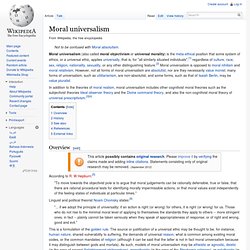
W Hepburn:[5] "To move towards the objectivist pole is to argue that moral judgements can be rationally defensible, true or false, that there are rational procedural tests for identifying morally impermissible actions, or that moral values exist independently of the feeling-states of individuals at particular times.
" Linguist and political theorist Noam Chomsky states:[6] "... if we adopt the principle of universality: if an action is right (or wrong) for others, it is right (or wrong) for us. This is a formulation of the golden rule. History[edit] See also[edit] References[edit] Jump up ^ Garth Kemerling (November 12, 2011). External links[edit] The Middle Way as the basis of moral objectivity. Moral realism. Moral realism stands in opposition to all forms of moral anti-realism and moral skepticism, including: ethical subjectivism (which denies that moral propositions refer to objective facts);error theory (which denies that any moral propositions are true); and,non-cognitivism (which denies that moral sentences express propositions at all).
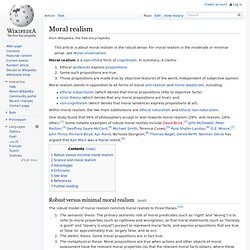
Within moral realism, the two main subdivisions are ethical naturalism and ethical non-naturalism. Objectivity (philosophy) "Objectivism" is a term that describes a branch of philosophy that originated in the early nineteenth century.
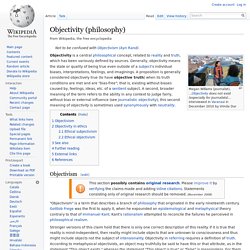
Gottlob Frege was the first to apply it, when he expounded an epistemological and metaphysical theory contrary to that of Immanuel Kant. Kant's rationalism attempted to reconcile the failures he perceived in philosophical realism. Stronger versions of this claim hold that there is only one correct description of this reality. If it is true that reality is mind-independent, then reality might include objects that are unknown to consciousness and thus might include objects not the subject of intensionality. Objectivity in referring requires a definition of truth. Plato's realism was a form of metaphysical objectivism, holding that the Ideas exist objectively and independently. The importance of perception in evaluating and understanding objective reality is debated.
The term, "ethical subjectivism," covers two distinct theories in ethics. Objektivität. Objektivität (von lateinisch obiacere : gegenüberliegen oder obicere : das Entgegengeworfene, der Vorwurf oder der Einwurf) ist in der europäischen Philosophie die Unabhängigkeit der Beurteilung oder Beschreibung einer Sache, eines Ereignisses oder eines Sachverhalts vom Beobachter beziehungsweise vom Subjekt.

Der Begriff der Objektivität unterliegt wie alle philosophischen Begriffe einem schwankenden Sprachgebrauch, d.h. seine genaue Bedeutung ist umstritten. List of humanists. Thomas More. Pope Pius XI canonised More in 1935 as a martyr of the schism that separated the Church of England from Rome; Pope John Paul II in 2000 declared More the "heavenly Patron of Statesmen and Politicians".[4] Since 1980, the Church of England has remembered More liturgically as a Reformation martyr.[5] In 2002, he was placed at number 37 in the BBC's poll of the 100 Greatest Britons.[6] Early life[edit] More began his studies at Oxford in 1492, and received a classical education.
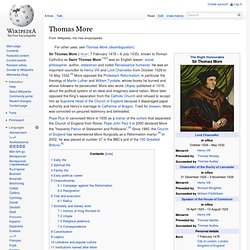
Studying under Thomas Linacre and William Grocyn, he became proficient in both Greek and Latin. Margaret Roper. Portrait of Margaret Roper, from a 1593 reproduction of a now-lost Hans Holbein portrait of all of the women of Thomas More 's family.

Margaret Roper ( née More ) (1505–1544) was an English writer and translator, probably the most learned woman of sixteenth century England. She was the daughter of Thomas More and Jane Colt, who probably died of childbirth. Margaret, "Meg" as her father used to call her, married William Roper . During More's imprisonment in the Tower of London , she was a frequent visitor to his cell. Margaret Roper. Humanism. In modern times, humanist movements are typically aligned with secularism, and today "Humanism" typically refers to a non-theistic life stance centred on human agency, and looking to science instead of religious dogma in order to understand the world.[2] Background The word "Humanism" is ultimately derived from the Latin concept humanitas, and, like most other words ending in -ism, entered English in the nineteenth century.
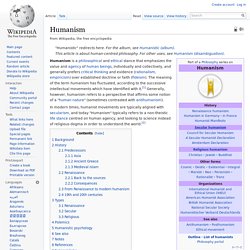
However, historians agree that the concept predates the label invented to describe it, encompassing the various meanings ascribed to humanitas, which included both benevolence toward one's fellow humans and the values imparted by bonae litterae or humane learning (literally "good letters"). In the second century A.D, a Latin grammarian, Aulus Gellius (c. 125– c. 180), complained: Gellius says that in his day humanitas is commonly used as a synonym for philanthropy – or kindness and benevolence toward one's fellow human being.
History Predecessors Asia Ancient Greece Types. Humanismus. Humanismus ist eine seit dem 19.
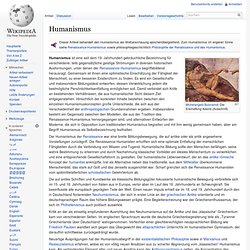
Jahrhundert gebräuchliche Bezeichnung für verschiedene, teils gegensätzliche geistige Strömungen in diversen historischen Ausformungen, unter denen der Renaissance-Humanismus begriffsbildend herausragt. Gemeinsam ist ihnen eine optimistische Einschätzung der Fähigkeit der Menschheit, zu einer besseren Existenzform zu finden. Es wird ein Gesellschafts- und insbesondere Bildungsideal entworfen, dessen Verwirklichung jedem die bestmögliche Persönlichkeitsentfaltung ermöglichen soll. Damit verbindet sich Kritik an bestehenden Verhältnissen, die aus humanistischer Sicht diesem Ziel entgegenstehen. Hinsichtlich der konkreten Inhalte bestehen zwischen den einzelnen Humanismuskonzepten große Unterschiede, die sich aus der Verschiedenheit der anthropologischen Grundannahmen ergeben.